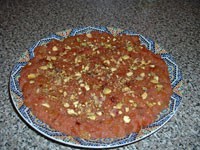Decades of Chaos': Arab leaders Condemn US Decision on Jerusalem
Donald Trump’s unilateral move to back Israel’s claim to holy city has reunited competing factions across the Middle East to a common cause
A Jordanian protester holds a poster depicting the US president Donald Trump during a demonstration outside the US embassy in Amman. Photograph: Amel Pain/EPASOURCE: THE GUARDIAN
BY: MARTIN CHULOV
The Trump administration’s recognition of Jerusalem as Israel’s capital has drawn widespread condemnation across the Arab world, with political leaders, commentators and locals labelling the move as provocative and a threat to global security.
The decision has been cast as the final nail in the coffin of a two-state solution to the Israel/Palestine conflict – an approach broadly recognised by Arab states – and the end of meaningful US diplomacy between both sides after almost 70 years.
It has also allowed competing factions across the Middle East to refocus on a common cause that had drifted from the spotlight over the past five years, eclipsed by regional power plays, war and insurrection.
The future of Jerusalem had been central to all previous peace pushes and commentators and residents were united in their belief that negotiations could not begin if the Palestinians’ claim to the holy city was no longer on the table.
Jordan’s King Abdullah said: “There is no alternative to a two-state solution, and Jerusalem is key to any peace agreement. It is imperative to work fast to reach a final status solution and a peace agreement. Ignoring Palestinian Muslim and Christian rights in the holy city could fuel terrorism.”
In Beirut, Hassan Nasrallah, the Hezbollah leader, called for demonstrations on Monday to protest against the decision. “Trump had support from the Arabs or else he wouldn’t have been able to do this,” said Nasrallah. “The Arab government will scream for a few days then go on with the occupation. America has shown that it doesn’t take into account the opinion of its allies.”
But US ally Saudi Arabia was also quick to denounce the move. Riyadh had sponsored a regional peace initiative that promised full Arab League recognition of Israel in return for a retreat to borders that were in place before the 1967 war.
That plan had been the centrepiece of dormant peace efforts. However, it had barely been raised in recent years as energies had been diverted to other regional crises, and support in Riyadh and the Gulf states for the Palestinian leadership had ebbed.
Ali Nassereddine, a chef from the Shia suburb of Dahiyeh in south Beirut, claimed Trump’s announcement had likely been coordinated with the Saudis and other allies, including the UAE. Echoing sentiments also widely expressed in Syria and Turkey, he said: “The decision was not only based on Israelis and Americans, the Arabs had a hand in it. The question should be directed to the Palestinians and [Palestinian leader] Mahmoud Abbas and all the resistance: do you now realise that negotiations will not get you anywhere?
In Iraq, powerful militia and political leaders vehemently condemned the move. Muqtadr al-Sadr, a Shia leader and chief protagonist in the country’s civil war, said: “I am ready to be the first soldier, not even leader, if all factions involved decided to confront Israel. No peace with the evil, arrogant and colonial governments. I ask of the Palestinians not to accept this decision in any way, and to revitalise the revolution.”
Other militia groups in Iraq also issued an effective call to arms, as did al-Qaida in the Arabian Peninsula. There was no immediate response from other regional terror groups, such as Islamic State.
Khalid al-Zubidi, a commentator for the Jordanian newspaper Ad Dustour, said: “Despite the turmoil the Arab world has faced the last years with governments turning on each other or on themselves, there are still some situations that we cannot negotiate. Jerusalem is one of them for Arabs.”
Writing in the Saudi-aligned Asharq al-Awsat, Samir Atallah said: “Previous American presidents never touched on the subject of Jerusalem because they knew it goes beyond the Israeli Palestinian conflict. It involves Muslims worldwide. Unfortunately Trump doesn’t have a historical or political background. If his intention is to solve the Palestinian conflict he chose the wrong door. Jerusalem is not a political symbol but will forever be a religious one.”
Khalid Zuberi, a banker in Cairo, said: “This shows [Trump] has bad faith towards us. He is a fool and he did this to be provocative. We all know he wants to please those who elected him, like the US Christian Zionists. But he must understand from his friends in the region that this will cause chaos. It will be difficult to be an American businessman or tourist here now. More than that though, the region is condemned to decades of chaos because of this.”








